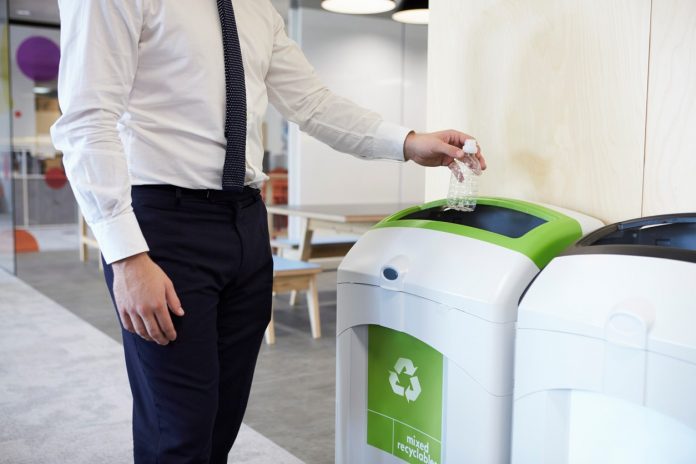While many people state they recycle at home, adoption of sustainable waste practices in the workplace and other contexts (particularly, on holiday) is often lower. Understanding how to promote more sustainable behaviors (including, but also going beyond, recycling) across a range of contexts remains a key challenge for policy-makers and researchers.
Interview findings indicate a range of motivations and barriers to recycling in the workplace, and inconsistency across home and work behaviors. Expanding the focus to include holiday as well as workplace and home contexts, our survey analysis shows that the proportion of waste recycled in the home is higher (67%) than in the workplace (39%) and on holiday (38%).
According to the “waste hierarchy” (reduce, reuse, recycle), which is the product lifecycle approach underpinning European legislation on waste (European Commission, 2014), the most effective means of reducing waste is to prevent waste in the first place (e.g., avoiding products with excessive packaging; consuming fewer products), followed by reusing or finding new uses for items, while recycling is the least effective strategy for reducing waste.
Interventions to encourage waste reduction (beyond recycling) include financial measures, such as carrier bag charging and “pay-per-bin” schemes (i.e., local councils charge residents for each refuse bin filled), which have been found to be effective (Gardner and Stern, 1996; Poortinga et al., 2013). This indicates a lack of motivation to reduce waste rather than primarily structural impediments to waste reduction.
The Theory of Planned Behavior (TPB; Ajzen, 1991) has been applied to a range of environmentally-friendly behaviors, including waste reduction (Cheung et al., 1999; Kaiser et al., 2005). The TPB states that intentions predict behavior and that intentions are a function of social norms, attitudes, and perceived behavioral control.
…A variety of contextual (physical, organizational, informational) barriers to waste reduction were mentioned by interviewees. These included: unclear rules, lack of bin labeling, collection infrequency, limited storage space, limited awareness of facilities, health and safety regulations, actions by cleaners, and sterilization cost.
Conversely, interviewees also mentioned some drivers of waste reduction. These included pragmatic factors, such as availability of supporting facilities or cost reduction. For example, several participants noted that some items could be reused at work by pooling equipment, where relevant schemes had been implemented. Others noted that “money is tight” (Robin, Earth Sciences), or the cost of buying new equipment instead of reusing items.
Other drivers of waste reduction were more normative or cultural, including personal values, habits (from home), social norms, and organizational policy or colleague encouragement.
Analysis:
This piece presents an interesting angle about how context affects our waste behaviors, and I would be very curious to understand how this principle applies to waste behavior on campus vs. in students’ permanent homes. Settings play a very important role in behavior at large, I wonder if the somewhat transient nature of being a college student (i.e. a sense of impermanence and constant transition) removes a sense of personal responsibility that students would normally feel outside of the college campus setting.




